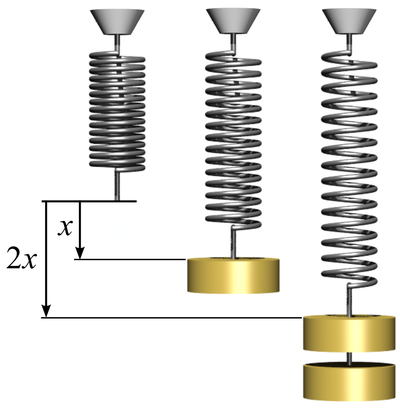Difference between revisions of "Hooke's Law"
| Line 6: | Line 6: | ||
: '''Hooke's Law''' describes how [[elastic]] [[object]]s behave when a pair of opposing [[force]]s is applied. | : '''Hooke's Law''' describes how [[elastic]] [[object]]s behave when a pair of opposing [[force]]s is applied. | ||
: '''Hooke's Law''' is described by the equation: Force = Spring Constant x Extension | : '''Hooke's Law''' is described by the equation: Force = Spring Constant x Extension | ||
| + | |||
| + | {| class="wikitable" | ||
| + | |- | ||
| + | |[[File:HookesLawSpring.png|center|400px]] | ||
| + | |- | ||
| + | | style="height:20px; width:200px; text-align:left;" |When a [[weight]] is added the spring [[Extension|extends]]. If the [[weight]] is doubled the [[extension]] is also doubled. | ||
| + | |} | ||
===Equation=== | ===Equation=== | ||
Revision as of 10:04, 14 October 2018
Key Stage 3
Meaning
Hooke's Law states that the extension of an elastic object is proportional to the force applied to the object.
About Hooke's Law
- Hooke's Law describes how elastic objects behave when a pair of opposing forces is applied.
- Hooke's Law is described by the equation: Force = Spring Constant x Extension
| When a weight is added the spring extends. If the weight is doubled the extension is also doubled. |
Equation
\( F = kx \)
\( F = k \times x \)
Where: \[F\] = Force applied \[k\] = Spring Constant (stiffness of the elastic object) \[x\] = Extension of the object
